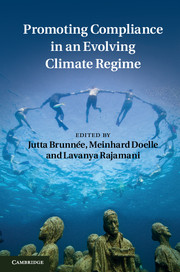Book contents
- Frontmatter
- Contents
- Contributors
- Preface
- Abbreviations
- Introduction: The role of compliance in an evolving climate regime
- Part I Context
- Part II The Kyoto compliance system: Features and experience
- Part III Compliance and the climate regime: Issues, options, and challenges
- 7 The role of non-state actors in climate compliance
- 8 Facilitation of compliance
- 9 Enforcing compliance in an evolving climate regime
- 10 Financial mechanisms under the climate regime
- 11 Post-2012 compliance and carbon markets
- 12 Compliance and the use of trade measures
- 13 ‘Comparability of efforts’ among developed country parties and the post-2012 compliance system
- 14 From the Kyoto compliance system to MRV
- 15 Compliance in transition countries
- 16 Developing countries and compliance in the climate regime
- 17 The role of dispute settlement in the climate regime
- 18 Depoliticizing compliance
- Part IV A look forward
- Bibliography
- Index
18 - Depoliticizing compliance
Published online by Cambridge University Press: 05 January 2012
- Frontmatter
- Contents
- Contributors
- Preface
- Abbreviations
- Introduction: The role of compliance in an evolving climate regime
- Part I Context
- Part II The Kyoto compliance system: Features and experience
- Part III Compliance and the climate regime: Issues, options, and challenges
- 7 The role of non-state actors in climate compliance
- 8 Facilitation of compliance
- 9 Enforcing compliance in an evolving climate regime
- 10 Financial mechanisms under the climate regime
- 11 Post-2012 compliance and carbon markets
- 12 Compliance and the use of trade measures
- 13 ‘Comparability of efforts’ among developed country parties and the post-2012 compliance system
- 14 From the Kyoto compliance system to MRV
- 15 Compliance in transition countries
- 16 Developing countries and compliance in the climate regime
- 17 The role of dispute settlement in the climate regime
- 18 Depoliticizing compliance
- Part IV A look forward
- Bibliography
- Index
Summary
Introduction
International climate cooperation is first and foremost of a political character. It is essential that political leaders commit to reductions in greenhouse emissions, adaptation measures, protection of forests, and transfer of financial resources and capacity building. At the same time, the need for independent organs and experts is also acknowledged. The scientific authority of the Intergovernmental Panel on Climate Change (IPCC) is based on its independence and expertise and the secretariat of the United Nations Framework Convention on Climate Change (FCCC), while accountable to the Conference of the Parties/Conference of the Parties Serving as the meeting of the parties to the Kyoto Protocol (COP/CMP), is independent from individual state parties, and is expected to respect professional standards. This independence from political interference is seen as a guarantee of a reliable execution of the task at hand.
Likewise, both effectiveness and legitimacy may be served by establishing independent organs with power to control national implementation of international climate change obligations. First, depoliticization may be achieved through establishment of independent organs (‘institutional independence’). Second, depoliticization may take the form of legalization, i.e. through establishing commitments and procedures in binding legal instruments (‘formal independence’). Depoliticization, while important, must be controlled. Due process guarantees (‘procedural safeguards’) are a quid pro quo in the sense that empowered independent organs should be subject to procedural control. Moreover, independent organs should be politically accountable. In this way the circle is completed: independent organs are established by political organs and are accountable to such organs.
- Type
- Chapter
- Information
- Promoting Compliance in an Evolving Climate Regime , pp. 418 - 434Publisher: Cambridge University PressPrint publication year: 2011



